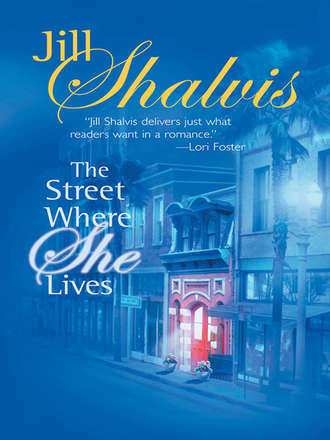
Полная версия
The Street Where She Lives

“Ms. Shalvis draws the reader into her stories immediately and creates a devastatingly tender love story with plenty of action and intrigue.
She knows how to deliver.”
—Rendezvous
“Rachel, I can’t talk to you when you’re wearing that stupid hat.” Before she could react, Ben whisked it off her head.
And froze.
Her soft, flowing hair was…gone, leaving a short, choppy cut of maybe an inch or so. The extent of everything she’d been through—the accident, the pain, the slow, ongoing recovery—suddenly hit him. He hated himself for reminding her, for reducing her to tears.
But he’d forgotten—Rachel would never allow anyone to see such a thing. Crying in public would be unacceptable. Crying in front of him would be tantamount to disaster.
Instead, as regal as ever, she remained calm, her head high. “Ben, go away.”
Gently he put the cap back on her head, his fingers brushing over her warm, smooth skin. “I’m sorry.”
“Don’t even look at me.”
He realized they were not on the same plane, that she apparently thought the sight of her had sickened him. “No, wait. Rachel—” He dragged in a deep, ragged breath. “You look…alive. Isn’t that all that matters?”
JILL SHALVIS
has been making up stories since she could hold a pencil. Now, thankfully, she gets to do it for a living, and doesn’t plan to ever stop. She is the bestselling, award-winning author of over two dozen novels, including series romance for both Harlequin and Silhouette. She’s hit the Waldenbooks bestsellers list, is a 2000 RITA® Award nominee and is a two-time National Reader’s Choice Award winner. She has been nominated for a Romantic Times Career Achievement Award in Romantic Comedy, Best Duets and Best Temptation. Jill lives in California with her family.
The Street Where She Lives
Jill Shalvis

CONTENTS
CHAPTER ONE
CHAPTER TWO
CHAPTER THREE
CHAPTER FOUR
CHAPTER FIVE
CHAPTER SIX
CHAPTER SEVEN
CHAPTER EIGHT
CHAPTER NINE
CHAPTER TEN
CHAPTER ELEVEN
CHAPTER TWELVE
CHAPTER THIRTEEN
CHAPTER FOURTEEN
CHAPTER FIFTEEN
CHAPTER SIXTEEN
CHAPTER SEVENTEEN
CHAPTER EIGHTEEN
CHAPTER NINETEEN
CHAPTER TWENTY
CHAPTER TWENTY-ONE
CHAPTER ONE
HE’D ONCE BEEN CALLED a selfish bastard, and Ben Asher figured that to be a fairly accurate assessment. He lived his life on his own terms and kept his emotional entanglements pared down to, well, him. Thanks to his freelancing job as a photojournalist for National Geographic and Outside, among others, he could pack up and leave at the drop of a hat, without looking back. Even now, after only a few months of being in the Amazon, he’d be moving on to his next assignment soon.
Good old Africa, here he came.
He moved through the strangling, thick, wet, green growth so unique to the Brazilian jungle, finally breaking free into a small clearing containing a couple of temporary structures. He crossed the clearing and stepped over the threshold of the reserve’s office, which, due to the proverbial lack of funds, was the size of a postage stamp. They’d been without electricity and phones for nearly a month, only just today getting the phones turned on. Warily, he met Maria’s glare. Apparently the calls were coming in too fast and furious for her liking.
Maria, his temp, had been forced to walk approximately twenty-five big, whopping yards from the office to the radio hut to radio him about this call. Noting it was hotter than hell outside, he figured he understood. “Gracias.”
She didn’t respond, but then again, she rarely did. She’d come to him from his previous assignment near Rio, where Ben had uncovered a so-called American ministry. The “minister,” Manuel Asada, had run an international charity scam, which through the years had earned him untold wealth. Targeting churchgoing, generous souls in the name of humanity, Asada had solicited funds and promised to build villages and feed the poor.
Instead, he’d pocketed everything, killing anyone who defied him or got in his way. He also had a nasty habit of abusing the local women. Maria had been one of them. Together with her testimony and Ben’s photographs evidencing some of the crimes, Asada was now languishing in a Brazilian prison, but would soon be extradited to the States. There he’d face some of his swindled victims in court, not to mention murder charges on no less than three counts.
Secretly, Ben hoped Asada remained in Brazil, where he had a better chance of actually staying in a jail cell. He’d sworn vengeance on everyone who’d taken him and his profitable business down, including family members and loved ones. Luckily, in Ben’s case, that meant fewer people than the fingers on one hand.
He picked up the phone. “Asher.”
“D-daddy?”
At the sound of his daughter’s quavering, frightened voice, his heart stopped. “Emmie? What’s the matter?”
Loud, crackling static filled the line, reminding him that thousands of miles separated him and his twelve-going-on-thirty-year-old daughter. “Emily?”
Nothing, just more static, and Ben damned the poor phone lines, the pathetic equipment, the shack he’d called home for two months. “Emily!” Panic had a bitter taste, he discovered. Sweat trickled down his back as he sank to a rickety chair. The humid air made his shirt cling to him like a second skin. “Come on, come on,” he muttered, and banged the phone on the scratched, beat-up desk, swearing uselessly before whipping the phone back up to his ear.
“Daddy?”
Sagging in relief, Ben relaxed his folded-up, taut legs, and promptly smashed his knees into the wood. He took in a breath of the closed-in air around him. “I’m here! Are you all right?”
“Yes.”
Thank God. “Where are you?”
Not a good father question, he noted with disgust. Any father, any good father, would know where his daughter was at all times. Not that his father had ever taught him such things, but he knew how parenthood was supposed to work.
“I’m home,” she said.
She meant her home, of course, which she made with her mother in South Village, California.
“You’ve got to come.” Across the too many miles and years, her voice broke, killing him. “Please, don’t say you can’t.”
Ben spoke to his precious, only child far too seldom. And she was precious. She was also brilliant, which never failed to both amaze and terrify him. In any case, it would be easy to blame his heavy travel schedule as a photojournalist or even the fact that his cell phone rarely worked for the lack of time they’d spent together. But the truth was, it was his own need to roam at will, to never set down roots that caused the problem. The story of his life. He was nearly thirty-one years old, and had yet to figure out the cure for insatiable wanderlust.
He didn’t need a shrink to know that came from his upbringing. Work harder, Benny boy, or we’ll send you back.
That bit of wisdom had come directly from Rosemary, his foster mother. Don’t say the wrong thing, Benny, we’ll send you back. Don’t rock the boat, Benny, we’ll send you back.
He’d gotten the message loud and clear. Don’t say a word, because no one wanted to hear it.
Well, he’d cut out his own tongue before giving his own daughter a similar message. “Em? Talk to me.” The static was bad, but he thought he heard a sad, little sniff, and his stomach hit his toes.
“It’s about Mom.”
As it had for thirteen long years, just the thought of Rachel caused conflicting emotions to race through Ben—pain and regret. Regret and pain.
Mostly pain.
Whoever had said time heals all wounds was full of shit.
“It’s really bad this time,” she said with another little sniff.
Okay, he got it now. Ben relaxed marginally, because for spending so little time together, he and Emily were well versed in this play. The last time it’d been “really bad” Emily had wanted to day trade on the Internet with Rachel’s investment account. The time before that she’d been campaigning to be homeschooled so she could travel with him, which besides being a really bad idea—what did he know about kids?—had nearly caused Rachel to blow a gasket.
Ben leaned back, scraping his too wide shoulders on the narrow, splintery chair back. “What is it this time, she won’t let you take an extra math class?” His daughter was famous for overloading on school in order to avoid socializing—which Ben blamed on Rachel since he’d never asked for more schoolwork in his life. The irony of the whole thing amazed him. It’d taken one hundred percent of his energies just to survive his childhood, and yet Emily, free to enjoy her youth in a way he couldn’t have even dreamed of, chose to work herself into the ground. “You don’t take enough time to be a kid—”
“No, you don’t understand!” A sound crossed the airwaves, one that sounded suspiciously like a sob. “She’s had an accident…. We tried to call you, but we couldn’t get through, and then Aunt Melanie said I should try again…”
Black spots filled his vision. Probably the steamy, muggy weather. But that was a lie, a damn lie. After all these years and all the heartache, he still didn’t want Rachel hurt.
“An accident?” The black spots blossomed, showing him remembered visions from all those years ago. His first sight of her, in English class at school; tall, willowy, hauntingly beautiful. She’d been so far out of his league, him being nothing more than a foster kid from The Tracks, a sleazy area of South Village no one wanted to lay claim to. But she’d looked at him that day, from eyes that held a mirroring loneliness, a mirroring pain, and he’d fallen a little bit in love on the spot.
He hadn’t expected her to feel the same way, and had figured he’d hit the lottery when she’d smiled back. As he’d gotten to know her, and her demons, he hadn’t had a chance in hell at keeping his distance. Their time together, every single minute of those six months, the intensity of it, the passion, had been heaven on earth. Until she’d taken it all away, nearly destroying him in the process.
“She got hit by a car and almost died.”
My God. That lovely, giving, warm, unforgettable body broken and bleeding and hurt? Vaguely, he caught a horrifying list of injuries.
“…and a cracked pelvis, too. Broken arm, ribs, leg and ankle, all down her left side where, um, the car slammed into her.”
Ben couldn’t process it, couldn’t begin to imagine.
“And there was some brain injury, but the surgery went really, really good.”
The hope in Emily’s voice sliced through him like a razor blade. “Brain injury?”
“Yeah, it made her talk funny at first, but she’s better now. Sometimes it takes her a minute to, like, coordinate herself, but the doctor says that’s temporary.”
“Okay.” Ben realized he’d been holding his breath and he let it slowly out. Guilt sliced through him for every not so charitable thought he’d ever spared about Rachel over the years, and there’d been many.
“The doctors say she’s going to be fine,” Emily said in his ear, her voice still wavering even as she became the comforter. “But, Daddy, she needs help.”
She couldn’t need money, Ben thought. Rachel had inherited gobs of it from her workaholic father who’d probably entered hell pissed off that he couldn’t bring his fortune with him. Not to mention, Rachel was hugely successful in her own right as a popular cartoonist. Her famous comic strip, Gracie, earned her so much dough it made him dizzy to think about. But maybe she’d lost it all in the stocks or something. “I don’t have much at the moment,” he admitted having just last week made his regular substantial charitable donation.
What was the point in saving, when he didn’t have a place to keep it or someone who needed it? He had no family besides Emily, at least none that wanted to claim him. Being the eighth of nine wards in a foster home that gathered kids in the name of “Christian” duty—and for the monthly stipend—he’d gone all his life without material things. When he’d finally had the money to buy stuff, aside from his cameras, he got no satisfaction from it. If anything, material goods just tied him down. And after his first seventeen years of being held to one spot, being untethered was his greatest joy.
In fact, he’d been untethered for just about his entire adult life, cohabiting with some of the most rural and isolated people on earth. If it weren’t for Emily, he might never have reemerged into “society” at all.
“It’s not money she needs.” Emily hesitated, and Ben waited anxiously. His daughter was not only sharp as hell, but capable of reasoning far beyond her years. And she was reasoning now, silently, which always scared him.
What could Rachel, a woman who needed no one, possibly need from him?
“She wants to go home to recuperate. But she can’t really manage by herself. So she’s going to have to go somewhere else to get better, like a convalescent home. And then I’d have to go to Aunt Melanie’s and change schools. She’s really freaking out worrying about me.”
Damn it. Damn it. He didn’t want his daughter separated from her mother, and with Rachel’s sister one hundred and twenty miles north of them in Santa Barbara, that’s exactly what would happen. “We can hire a nurse,” he said.
“She’s trying, but it’s hard to find someone.”
Once upon a time, he’d known Rachel better than anyone. She’d had it tough, in a way even tougher than he had. As a result, she trusted no one. She’d rather lie down and die than accept help from a stranger.
Actually, unless she’d changed in thirteen years, she’d rather lie down and die than accept help from him. That feeling was mutual and had been since the day she’d decided he was no longer welcome in her life. It still bugged the hell out of him how easily she’d moved on, while he’d mourned and grieved her loss for years.
But he was over her now, very over her.
“Daddy, she’s determined to do it all, for me, but she’s going to hurt herself. Please? Please won’t you come?”
His daughter had rarely asked him for anything. And yet all he could do was panic at the thought of being caged, tied down to one place—that place—for God knows how long.
“Please,” she whispered again, her voice barely audible. “Please come home.”
The hustling, bustling, urban South Village, just outside Los Angeles, had never been his “home”—he’d had no real home. But since he hadn’t told his daughter about his past—about being found nearly dead in a trash bin when he was only two days old—he couldn’t very well explain it to her now.
And just because the word home was foreign to him didn’t mean it was that way for Emily. He’d give anything, everything, to ensure she never knew what it was like not to have a home.
“We need you, Daddy.”
A new coat of perspiration beaded his forehead. “She’ll refuse.”
“She knows she has no choice. It’s you, or hiring a stranger.”
“You know how she feels about me.”
“Yes.” She cleared her throat and spoke in a perfect imitation of Rachel. “You’re ‘wild, rough and unmolded.’”
Oh, yeah, that was a direct quote. He could hear the faint smile in his daughter’s voice, the daughter far too understanding and old for her years.
His fault.
“And danger is your middle name,” she intoned, still quoting.
Hmm.
“Oh! And you’re a selfish…” She lowered her voice. “Well. You-know-what.”
“Yeah.”
“You’re also—”
“Okay, okay.” Nothing like being humbled by your own child. Maria shoved an envelope in his hand. It was grimy, but then, everything here was. Addressed to him, it looked as if it’d been to hell and back before arriving here. The postmark date was five weeks ago, which didn’t surprise him. It was amazing it had gotten to him at all.
Inside was a perfectly spotless, perfectly folded piece of white paper. The chilling words read “I’m not done with you yet.”
Ben lifted his head and covered the mouthpiece with one hand. “Did you just get this?” he asked Maria in Spanish.
She nodded her head and looked at him from guarded black eyes.
Fear clawed Ben’s belly. “Asada.”
Maria paled at the name.
“Radio the authorities,” he said, still speaking Spanish. “Make sure he was extradited to the States as planned.”
She nodded and turned away.
As helplessness coursed through him, Emily continued to chatter in his ear. “You won’t be sorry, Dad! We can all be together. You know, like a family.”
Oh, boy. He’d have to deal with that later. For now, he had bigger issues. Asada had once sworn revenge, and now somehow appeared to be free to carry out his threats.
Five weeks free, if the postmark meant anything.
For the first time he could remember, he only half listened to his daughter’s monologue about all the things they could do if he was there. Under other circumstances he’d be amused and a little intimidated by Emily’s plans to make them a cozy nuclear family.
Maria came back, speaking in rapid-fire Spanish, shocking Ben, both because she was actually speaking unprompted, and by the words coming out of her mouth.
Five weeks ago, Asada had escaped in the middle of extradition to the States, adding the murder of two guards to his rap sheet in the process, and was thought to be somewhere between North and South America.
Christ. “Emily,” he said hoarsely, gripping the phone. “Tell me about your mom’s accident.”
“She was hit by a car.”
“When?”
“A month or so ago, you’ve been unreachable until now—”
“I know. Who hit her?”
“I don’t know. The police haven’t caught anyone.”
Ben dragged in a steady breath. “Okay, listen to me. I don’t want you to open the door or talk to any strangers, do you understand?”
“Daddy.” She laughed. “I’m twelve, not four.”
“Yes, but—”
“You gave me this talk years ago, remember? Don’t worry.”
“Emily—”
“Just say you’ll come back here to be with us while Mom gets better.” She hesitated, then went for the kill. “I love you, you know.”
Ah, hell. He was such a goner.
And he was going to South Village, California.
“I love you, too, baby. With all my heart. Now stay safe.” Please, God. “I’ll be there fast as I can catch a plane.”
CHAPTER TWO
EVEN AT THE tender age of five, Rachel knew what moving day meant. A new room, a new nanny, all of her toys in new places. She didn’t want to go, not again, neither did her sissie, but what they wanted didn’t matter.
“Goddamn it girl, suck it up.” This from her father. “Go find your mother if you’re going to snivel.”
Her mother waved her nearly empty glass of that stuff that looked like water but smelled bad—it would be years before Rachel came to know vodka was her mother’s drink of choice—and said, “Don’t look at me, there’s nothing I can do.”
A common refrain, one Rachel had learned to live by. With no more control over this move than the last one, or the one before that, she sat on the step, hugged her doll close and waited for the movers.
“Rachel.”
She tried to blink the porch into focus, but suddenly she wasn’t five years old anymore, it’d all been just another dream. She’d had a lot of those lately. As it had for the past month, the creeping, insidious pain joined by a nauseous claustrophobia jerked her fully awake. Logically, she knew the claustrophobia was from being trussed up like a mummy. But even worse was the sweat-inducing panic she felt from her complete lack of control over anything, including her own body.
“Oh, good, you’re awake.”
She grimaced at the deceptively kind voice of the nurse who carried needles, and used them often. “You couldn’t possibly need more blood.”
“Oh, just a little.”
“No way.”
Unperturbed, the nurse sat by Rachel and took out her blood kit.
“I mean it. Don’t even think about it.” But even Rachel had to let out a laugh, though it shot a bullet of sharp pain right through her. Most of her was still covered in either soft bandages or plaster casting. She hadn’t been able to move on her own since she’d crossed the street a month ago, heading toward Café Delight to have lunch with her agent, Gwen Ariani, and instead had been mistaken for a roadblock by a speeding car.
Among other physical problems she had, her brain seemed to have the hiccups, making coordinating movement a circus event. Her doctor told her that would probably be temporary. Probably. Good God. Forget the fact she needed fine motor skills to maintain her comic strip Gracie; things weren’t looking real good for the rest of her nice, cozy life. “I am not a pincushion.”
“Spunk.” The short, dark-haired nurse named Sandy nodded approvingly. “Give ’em hell, girl.” She swabbed Rachel’s arm, but had the good grace to look apologetic as she wielded the needle. When she was done, she patted Rachel’s hand—bandaged to the tips of her still healing fingers. “Oh, and hey, good news. Most of the bandages come off today. Dr. Thompson will be here this morning.”
“And how about the casts?” Rachel found herself coming to life for the first time that day. That month.
“You’re going to go from plaster to air casts.”
“What’s the difference?”
“You’ll be more mobile and lightweight. It’s a good thing.” Sandy headed for the door. “Now, don’t you worry your pretty little head over any of the details. I’ll be back with the doctor in a few.”
Rachel studied the ceiling, her new hobby. There were eighty-four ceiling tiles in the room. She’d worry her pretty little head all right—the “pretty” part no longer applying, of course. She’d worry because she knew. They would release her, maybe as early as the end of the week, but it didn’t mean freedom.
For at least a couple of months she needed help, a fate worse than death as far as she was concerned. She’d learned her love of control from her overly controlled, overly authoritative, overly guarded childhood. That she would need someone to help dress her, help her move around, help her in every way, was extremely…frightening.
What she really needed right now was a powerful, virile husband.
Ha!
To get a husband, she’d have to seriously date someone. To do that she’d actually have to let that someone into her life. And to let someone into her life, especially a male someone, she’d have to… Well, she’d have to do a whole hell of a lot, including honing up on the social skills she’d let get so rusty.
Since that wasn’t about to happen, Rachel had no choice, no choice at all. A nurse. A temporary nurse. Either a huge, beefy woman or a male, it didn’t really matter at this point. She had so little pride left.
Just as long as she and Emily got to be at home, together, nothing else truly mattered.
Which brought to the surface her greatest worry. How was she going to manage without being a burden on her teenage alien—er, daughter?
Her hospital room door opened again, and she heard the voice of Sandy, coming back with Dr. Thompson.
Closing her eyes, she feigned sleep. It was unlike her to pretend anything, but in this case, where everyone persisted in talking to her as if she’d suffered permanent brain damage, eavesdropping had become a necessity.
She wanted to know their plans for her, because no way was she accepting anything but release papers. No convalescent care, no way. Forcing her taut muscles to relax wasn’t easy. Over a month after the accident she couldn’t yet quite remember, and every inch of her still ached.









